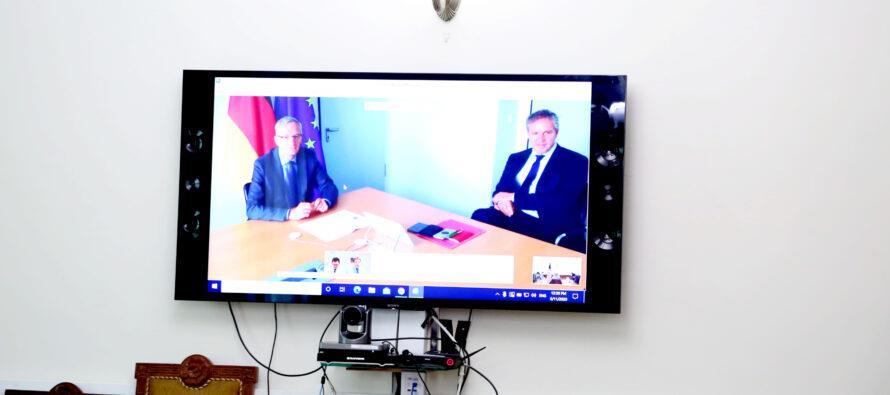
Afghanistan- Germany Commits over AFN 5 Billion to Help Mitigate Social & Economic Aspects of COVID-19
(MENAFN- Wadsam) The German Federal Ministry for Economic Cooperation and Development (BMZ) has pledged AFN 5.77 billion (EUR 69.8 million) to Afghanistan.
The funds are for immediate and direct response to challenges of the Afghan public sector and the private economy to help mitigate the social and economic consequences of COVID-19. These funds are provided as a part of up to AFN 20.7 billion (EUR 250 million) that Germany intends to make available in 2020 for further bilateral cooperation. The German State Secretary Martin Jaeger of the BMZ informed the Afghan Acting Minister of Finance Abdul Hadi Arghandiwal and Deputy Finance Minister Abdul Habib Zadran about these commitments during a video conference call.
'Germany will continue to be a reliable partner for Afghanistan in these challenging times… [and] will continue to support Afghanistan on its path towards sustainable and inclusive development,' said Jaeger.
The German government is providing funding to Afghan-German Cooperation programs in quick and direct response to the coronavirus, its social and economic consequences, and the strain on the health system. The multi-donor Afghanistan Reconstruction Trust Fund (ARTF) will receive AFN 3.3 billion (EUR 40 million). The fund supports development measures implemented by the government of Afghanistan, which include promoting a functioning civil service, supporting basic social services and reducing poverty. The Afghan Credit Guarantee Foundation (ACGF), the Water Sector Improvement Program (WSIP), and the Sustainable Economic Development and Employment Program (SEDEP) will also receive funding.
'I would like to appreciate the German government's new commitment particularly in supporting our government in the efforts to respond the impacts of Covid-19. Germany has been a key and reliable partner in the reconstruction of Afghanistan. We are very much looking forward to our continued and mutually beneficial relationship,' said Arghandiwal.
While Germany supports the country's COVID-19 response, further government-to-government negotiations on development cooperation are due to take place later this year, with intended additional commitments to Afghanistan. The level of commitment is contingent on the progress in implementing the reform agenda agreed upon in the Geneva Mutual Accountability Framework (GMAF). The GMAF defines the most important reform areas that the Afghan government needs to address until the end of 2020. The reform areas include combating corruption, tackling violence against women, strengthening decentralized governance structures and land reform.
'Although the COVID-19 pandemic means that implementation of the agenda is now more difficult, additional reforms are still necessary in order to further improve governance and thus create the framework conditions needed for sustainable and inclusive development,' said Jaeger.
Both parties recognize the importance of fighting corruption. Jaeger said, 'Corruption undermines good governance and destroys people's trust in their government. It wastes scarce resources and has a far-reaching and damaging impact on economic and social development. It undermines the credibility of, and public support for, development cooperation and it hinders investment and transparent competition.'
Zadran said, 'Our donors can play a major role in helping us move towards self-reliance and financial independence through strengthening our government systems, more efficiency in aid, full alignment of the off-budget projects and more transparency.'
Between 2009 and 2019, the German government invested around AFN 347 billion (EUR 4.2 billion) in the civil reconstruction of Afghanistan. Germany and Afghanistan have combined efforts to target the priority areas of good governance, sustainable economic development, and improving municipal infrastructure. Since 2009, the Afghan-German Cooperation has carried out a total of more than 600 projects in over 330 districts, benefitting over 20 million people in all provinces.

Legal Disclaimer:
MENAFN provides the
information “as is” without warranty of any kind. We do not accept
any responsibility or liability for the accuracy, content, images,
videos, licenses, completeness, legality, or reliability of the information
contained in this article. If you have any complaints or copyright
issues related to this article, kindly contact the provider above.
Most popular stories
Market Research

- Pepeto Highlights $6.8M Presale Amid Ethereum's Price Moves And Opportunities
- Codego Launches Whitelabel Devices Bringing Tokens Into Daily Life
- Zeni.Ai Launches First AI-Powered Rewards Business Debit Card
- LYS Labs Moves Beyond Data And Aims To Become The Operating System For Automated Global Finance
- Whale.Io Launches Battlepass Season 3, Featuring $77,000 In Crypto Casino Rewards
- Ceffu Secures Full VASP Operating License From Dubai's VARA
















Comments
No comment